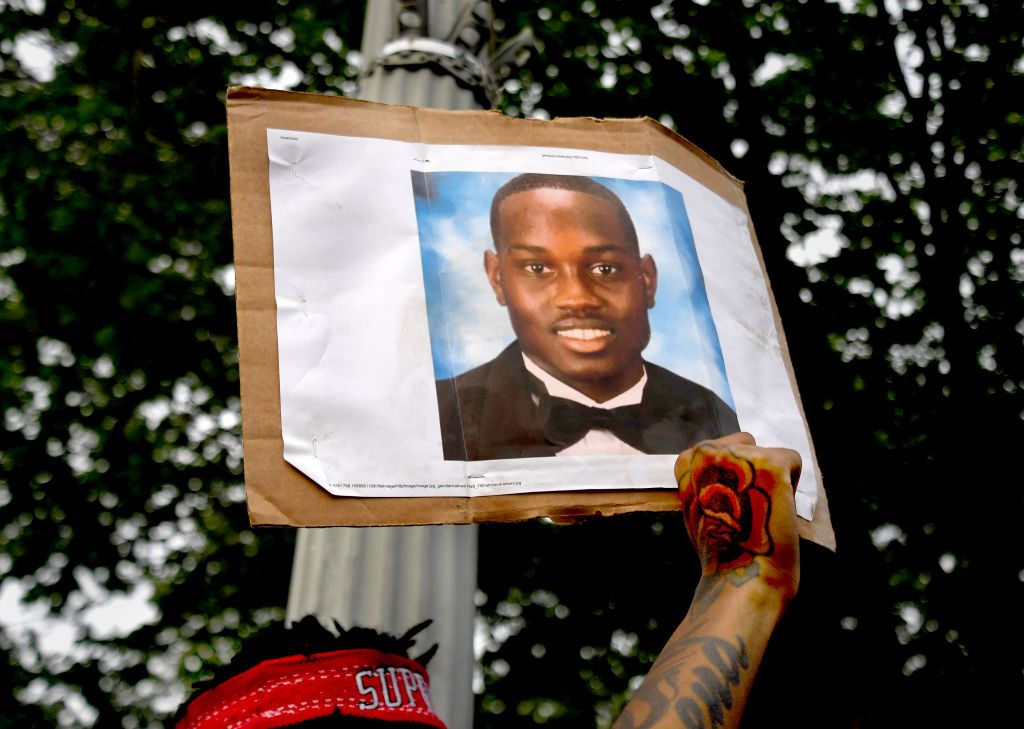One Year After Ahmaud Arbery’s Murder, Georgia Governor Announces Overhaul To Racist Citizen’s Arrest Law

Source: Sean Rayford / Getty
Georgia Governor Brian Kemp announced reform surrounding a Civil War-era citizens arrest law on Tuesday, which was initially cited as a reason to not pursue charges against the killers of Ahmaud Arbery.
With some exceptions, the proposed bill would prevent private citizens from conducting arrests on others. The new bill, proposed by Kemp, states that a detained person must be released if authorities do not arrive within an hour.
“Ahmaud was a victim of vigilante-style of violence that has no place in Georgia,” Kemp said. “And some tried to justify the actions of his killers by claiming they had the protection of an antiquated law that is ripe for abuse.”
Arbery’s mother Wanda Jones told News4Jax that she’s “overwhelmed” by the possibility, as Kemp’s statement comes just one week shy of the one-year anniversary of her son’s death.
Kemp’s announcement followed the advocacy of JustGeorgia, a coalition or organizers, lawyers, and organizations committed to transforming the legal system and ending racialized violence in the state. Organizational partners include the Georgia NAACP and the Southern Center for Human Rights.
One of the prosecutors who originally handled Arbery’s case relied on Georgia’s citizens arrest law to decline pursuing charges against Gregory and Travis McMichael. While the Georgia legislature passed a bipartisan hate crime bill last year, it did not address miscarriage of justice which initially allowed Arbery’s killers to escape accountability.
Beyond being an outdated law, citizen’s arrests laws have roots in early slave patrols of the late 1600s. Enacted in 1863, possibly as a response to the Emancipation Proclamation, Georgia’s law was created to capture enslaved people running away to join the Union Army. Opponents argue the laws enabled vigilante justice, targeting Black people.
James Woodall, president of the Georgia NAACP, said he supports the bill as its currently written.
“Private citizens detaining or arresting other citizens creates a public safety issue,” said Woodall in an interview with 11Alive. “And that’s not us saying that, these are sheriffs and police officers and lawyers who say these issues are one that lack of transparency in these engagements.”
“It is high time to repeal Georgia’s Citizen’s Arrest law,” said Marissa Dodson, Public Policy Director at the Southern Center for Human Rights in a statement. “It is unnecessary, dangerous, and has held a central role in perpetuating anti-Black vigilante violence both recently and historically.”
Mercer law professor Tim Floyd previously pointed to the law as being used by white lynch mobs as a justification for their actions. The McMichaels actions mirrored those of a lynch mob, chasing down the young man simply for daring to exist.
Often confused with stand your ground, or even traditional self-defense, citizen’s arrest has emboldened violent attacks on Black people. Woodall emphasized that passage of the amended law, while important, is only one step toward a more just Georgia.
“As we approach the first anniversary of Ahmaud’s death, the JustGeorgia Coalition has been able to work with legislators and state officials to create a safer state for all Georgians, which includes, but is not limited to, repealing Citizen’s Arrest,” said Woodall in a statement. “It will continue pushing forward necessary reforms, but this is a great first step to a more just Georgia.”
Anoa Changa is a movement journalist and retired attorney based in Atlanta, Georgia. Follow Anoa on Instagram and Twitter @thewaywithanoa.
SEE ALSO:
Georgia AG Rejects Fulton County DA’s Request For Recusal In Rayshard Brooks’ Murder Case
One Month Later: Why Georgia’s Runoffs Were A Game-Changer For The Diversity Of The Federal Courts
[ione_media_gallery id=”3955020″ overlay=”true”]

